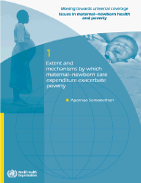Maternal–newborn health (MNH) care expenditures are a considerable burden on poor households in many countries. This paper commissioned by WHO reviews the available evidence and identifies pathways through which such spending causes poverty.
Abstract
This is a systematic review of the evidence base on maternal–newborn health (MNH) care expenditures and poverty. Critical gaps and weaknesses in the evidence base make it difficult to draw any firm conclusions about how and to what extent households are impoverished as a result of payments for MNH care. The review was however able to identify several possible pathways through which, in the absence of adequate social safety nets, MNH care expenditures contribute to poverty. The financial and time costs associated with seeking MNH care have a direct impact on households by absorbing a substantial share of their incomes. They have an indirect impact through the coping strategies that households adopt to deal with the financial catastrophe with which they are faced. Such strategies erode the asset base and increase the indebtedness of households, further undermining their efforts to escape poverty.

